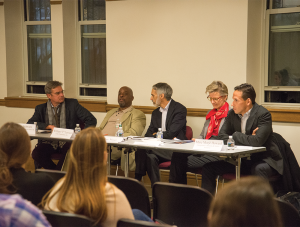
Panelists discussed the need to reduce the power of prosecutors and increase the role of social platforms to reduce recidivism in prison reform in an event on Wednesday.
The obstacles to ending mass incarceration in the United States are numerous but not intractable, according to four panelists at the “How to End Mass Incarceration” panel in McShain Lounge on Wednesday.
The event, sponsored by the Prisons and Justice Initiative, the Office of the Provost and the Department of African-American Studies, featured the first-ever president of the nonprofit news organization Marshall Project Carroll Bogert, executive director of the prison reform advocacy group Sentencing Project Marc Mauer and William Lawson, a former inmate who now works with Urban Preparedness, Inc.
Moderated by Georgetown English professor Henry Schwarz — formerly the director of the Program on Justice and Peace — the panel also included Marc Howard, founding director of the Prisons and Justice Initiative at Georgetown. The speakers aimed to answer not whether or not the United States needs to end mass incarceration, but how.
According to Bogert, the biggest problem with mass incarceration is the power of prosecutors.
“They have too much power in our system, they can decide whether they’re going to charge you with a misdemeanor or felony, and there’s very little review of what they do,” Bogert said. “What drives mass incarceration is people being charged with felonies who do not need to be. How you actually get into the minds of prosecutors and change them, I don’t know.”
Bogert said the problem of mass incarceration cannot be solved just with reforms inside prisons. Some of the most important reforms are social programs that keep people from entering prison in the first place, or returning after they leave.
“If there’s nothing for them on the outside, then as a society we’re not actually handling the problem,” Bogert said. “We’ve got to build up other capacities in our society to deal with social needs, because we are dumping all of it into this system, and this system is overloaded.”
Howard pointed to problems with the judicial system itself that contribute to excessive incarceration. Howard said states that elect judges, a rare feature of judicial systems internationally, lead judges to campaign on fear.
“One underlying element that I think is driving all of this, and is completely insane and American, is the politicization of judicial politics,” Howard said. “This role of politics should be taken out of these decisions; otherwise, it’s all about fear.”
Lawson said one of the difficulties of returning to life after prison is a lack of economic opportunity.
“Most of them come home with high expectations and once the reality hits them that they’re hungry and the people that they are with are hungry — that feeling of having to survive — kind of forces us to do what we think in our minds that we have to do,” Lawson said. “At the end of the day, they find themselves right back in the same situation that they were in prior to going to jail.”
According to Mauer, much of the relevant prison reform in the United States is happening at the state level.
“We have 51 criminal justice systems in the country, in the states and federal governments, so the vast majority of people behind bars are in the state or local prison or jail. There has been momentum in every state to reduce the population, reexamine criminal sentencing, reexamine the drug war,” Mauer said. “I think the momentum that we’ve seen hopefully can continue regardless of what comes out of the White House.”
Howard said the key to a more reasonable justice system is institutions that are free from political considerations and comfortable with risk.
“We need counselors, psychologists, experts, have them be immune to political consequences and tolerate a little bit of risk,” Howard said. “Because there’s always gonna be some risk, that’s part of life. but the way we’re doing it now is just lock them up, warehouse them, throw away the key, and that doesn’t make any sense.”




















